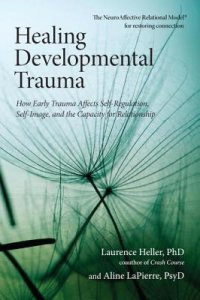
Ebook: Healing developmental trauma: how early trauma affects self-regulation, self-image, and the capacity for relationship
Author: Heller Phd Laurence, Lapierre Aline Psyd
- Tags: Psychology, Nonfiction, Self Help, Health, Mental Health, Personal Development, Counselling, Social Science, Social Work, Reference, Parenting, Adoption
- Year: 2012
- Publisher: North Atlantic Books
- City: Berkeley;Calif
- Language: English
- mobi
Although it may seem that humans suffer from an endless number of emotional problems and challenges,Healing Developmental Traumapresents a model for psychotherapy and growth showing that most emotional difficulties can be traced back to the compromised development of one or more five core capacities. These five core capacities are associated with biologically based core needs that are essential to our physical and emotional well-being: the needs for connection, attunement, trust, autonomy, and love-sexuality. Recognizing these needs as well as five Adaptive Survival Styles set in motion when the core needs are not met early in life, authors Laurence Heller and Aline LaPierre cut through the seeming complexity of life’s problems.
Explaining that an impaired capacity for connection to self and to others and the ensuing diminished aliveness are the hidden dimensions that underlie most psychological and many physiological problems, they introduce the NeuroAffective Relational Model®(NARM), a resource-oriented, psychodynamically informed approach that, while not ignoring a person’s past, emphasizes working in the present moment. NARM uses somatic mindfulness to re-regulate the nervous system and to resolve identity distortions—such as low self-esteem, shame, and chronic self-judgment—caused by developmental and relational trauma. Heller and LaPierre demonstrate how this therapy helps clients establish connection to the parts of self that are organized, coherent and functional, integrating the role of connection on all levels of experience as it affects a person's physiology, psychology, and capacity for relationship.
From the Trade Paperback edition.
Explaining that an impaired capacity for connection to self and to others and the ensuing diminished aliveness are the hidden dimensions that underlie most psychological and many physiological problems, they introduce the NeuroAffective Relational Model®(NARM), a resource-oriented, psychodynamically informed approach that, while not ignoring a person’s past, emphasizes working in the present moment. NARM uses somatic mindfulness to re-regulate the nervous system and to resolve identity distortions—such as low self-esteem, shame, and chronic self-judgment—caused by developmental and relational trauma. Heller and LaPierre demonstrate how this therapy helps clients establish connection to the parts of self that are organized, coherent and functional, integrating the role of connection on all levels of experience as it affects a person's physiology, psychology, and capacity for relationship.
From the Trade Paperback edition.
Download the book Healing developmental trauma: how early trauma affects self-regulation, self-image, and the capacity for relationship for free or read online
Continue reading on any device:

Last viewed books
Related books
{related-news}
Comments (0)